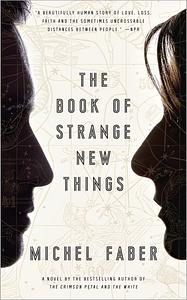You need to sign in or sign up before continuing.
Take a photo of a barcode or cover
Peter, the missionary, travels to another planet to teach aliens about Christianity, leaving behind his beloved wife Bea, while Planet Earth goes to pot. The planet is bland looking and not that pleasant and everyone seems to be disengaged or a bit depressed. The aliens, Ossans, are very keen to learn about the Bible and Peter lives amongst them, much to the bemusement of the others, who look down on the aliens and seem disgusted by them. Peter becomes completely engrossed with his mission, to the detriment of his relationship of his suffering wife who has a crisis of faith as life for her becomes bleaker and bleaker. He comes to an awakening about this new life, leaves the Ossans with his translated Bible copies and wants to return to Earth to be with Bea.
3.5. Uggggh. This book was great until the end and then I just felt let down.
emotional
mysterious
sad
medium-paced
Plot or Character Driven:
A mix
Strong character development:
Yes
Loveable characters:
Complicated
Diverse cast of characters:
Yes
Flaws of characters a main focus:
No
The book was good for the most part. I gave it a low review because of a very triggering event for me.
Moderate: Animal cruelty
Summarized in a sentence, “The Book of Strange New Things,” by Michel Faber, sounds like a pretty standard science-fiction novel. Peter Leigh, an English pastor in the near future, is hired by a mysterious corporation, USIC, to travel to the newly discovered planet, Oasis, and minister to its receptive alien (or, rather, its non-human) population. But, despite its plot, “The Book of Strange New Things” doesn’t tread the typical science-fiction novel path. Like classic science fiction, the book feels like it has sinister twists lurking beneath it; but, unlike most books in that genre, it doesn’t unravel those twists. And, Faber leaves basic sci-fi questions unanswered (e.g., Why didn’t the Oasans have a religion before USIC came? Why is the rest of USIC so indifferent to the Oasans?), and spends little time explaining the technical aspects of space exploration.
Instead, “The Book of Strange New Things,” is “more subtle and mournful.” [Ron Charles, Washington Post]. Faber strips his science fiction premise “of all wonderment and amazement … [o]f all strangeness.” [Sheehan, NPR]. What’s left? A book that is part epistolary novel on long-distance love, and part exploration of religious faith. It’s an interesting mix that works surprisingly well.
In traveling to Oasis, Peter leaves his wife, Bea. Despite the distance, the two are able to communicate through text-only (no photos, no videos) email. Peter and Bea’s messages to one another take up a large portion of the book. And for good reason—through them, Faber describes a very convincing and affecting relationship, while also detailing life back on Peter-less Earth. Although the plot has so much else going on, I enjoyed reading these messages the most.
On Oasis, Peter finds the native population (the Oasans) welcoming and eager to adopt his Christian faith. Peter is at once inspired by the purity and sincerity of the Oasans faith, and insecure over his own. As life on Earth becomes increasingly violent and miserable, Bea loses her belief; and, Peter, whose belief is intertwined with his love for Bea, finds his slipping. In contrasting the Oasans with Peter, Faber suggests that the strength of religious faith (for humans) lies largely in the connections and human relationships we develop through it.
I enjoyed “The Book of Strange New Things,” and thought that—despite its length—it read quickly. I liked its subtlety and its flawed, very-real-feeling characters. Still, I just felt like there could have been more to it. Its plot ends at a good, but dissatisfying, point. And, I wish it more directly explored its themes—or, at least connected them more concretely to modern life. Nonetheless, a memorable book.
Instead, “The Book of Strange New Things,” is “more subtle and mournful.” [Ron Charles, Washington Post]. Faber strips his science fiction premise “of all wonderment and amazement … [o]f all strangeness.” [Sheehan, NPR]. What’s left? A book that is part epistolary novel on long-distance love, and part exploration of religious faith. It’s an interesting mix that works surprisingly well.
In traveling to Oasis, Peter leaves his wife, Bea. Despite the distance, the two are able to communicate through text-only (no photos, no videos) email. Peter and Bea’s messages to one another take up a large portion of the book. And for good reason—through them, Faber describes a very convincing and affecting relationship, while also detailing life back on Peter-less Earth. Although the plot has so much else going on, I enjoyed reading these messages the most.
On Oasis, Peter finds the native population (the Oasans) welcoming and eager to adopt his Christian faith. Peter is at once inspired by the purity and sincerity of the Oasans faith, and insecure over his own. As life on Earth becomes increasingly violent and miserable, Bea loses her belief; and, Peter, whose belief is intertwined with his love for Bea, finds his slipping. In contrasting the Oasans with Peter, Faber suggests that the strength of religious faith (for humans) lies largely in the connections and human relationships we develop through it.
I enjoyed “The Book of Strange New Things,” and thought that—despite its length—it read quickly. I liked its subtlety and its flawed, very-real-feeling characters. Still, I just felt like there could have been more to it. Its plot ends at a good, but dissatisfying, point. And, I wish it more directly explored its themes—or, at least connected them more concretely to modern life. Nonetheless, a memorable book.
adventurous
challenging
dark
emotional
funny
mysterious
reflective
medium-paced
Plot or Character Driven:
A mix
Strong character development:
Yes
Loveable characters:
Complicated
Diverse cast of characters:
No
Flaws of characters a main focus:
Yes
adventurous
emotional
mysterious
reflective
slow-paced
Fun read. And ripe for a sequel. (Though sadly, it looks like this will be the author's last book:
http://m.smh.com.au/entertainment/books/michel-faber-on-the-writing-of-his-final-novel-20141114-11mltj.html
It felt a little long with the religious passages at parts - probably could be 125 pages shorter. But I enjoyed it and had great visuals in my mind from the descriptions.
Recommendation if you liked this book: The Sparrow, and Children of God. Sort of similar, but those two (a two-part series) got 5 stars from me and are truly favorites. Hauntingly beautiful.
http://m.smh.com.au/entertainment/books/michel-faber-on-the-writing-of-his-final-novel-20141114-11mltj.html
It felt a little long with the religious passages at parts - probably could be 125 pages shorter. But I enjoyed it and had great visuals in my mind from the descriptions.
Recommendation if you liked this book: The Sparrow, and Children of God. Sort of similar, but those two (a two-part series) got 5 stars from me and are truly favorites. Hauntingly beautiful.
I was hoping for more out of this book. It was extremely slow. I was disappointed in how the main character behaved in the absence of his wife. He was so headstrong about his purpose he completely neglected just about everything, including his own sense of well being. I felt really bad for his wife the entire book, and even more-so at the end. I was really hoping that the Oasans would just eat Peter.
NPR put it best in their review, "It feels, more than anything, like an achingly gentle 500-page first chapter to an apocalypse novel yet to come."
NPR put it best in their review, "It feels, more than anything, like an achingly gentle 500-page first chapter to an apocalypse novel yet to come."
I saw this book recommended on NPR's list for 2014. I was very intrigued by the premise and the cover (I have to say.) I spent a lot of time reading reviews here and I agree with almost all of them.
I personally enjoy this take on "Sci-Fi lite". It's a new planet, it's space travel, it's aliens, but it's about something a little deeper. While not a religious person, I also enjoyed the religious perspective of the main protagonist, Peter. While I wouldn't consider it subtle, as it rules almost everything Peter does, it wasn't preachy. It was about what the scripture meant to Peter, not what it should mean to the reader.
The alien world in this book is fascinating! FASCINATING! I enjoyed every ounce of detail that was included. I also am quite fond of the alien species that Peter interacts with. I wish I knew more about them.
While the Peter and Bea's correspondence started out sweet and interesting, it became sort of sluggish. I didn't really understand her character arc because we weren't ever connected to her or her motivations. While Peter isn't a saint, I at least understood his thought process. I thought it would have been worthwhile to add Bea's point of view in addition to her letters.
Many have complained about the ambiguous ending. I liked it! Sometimes I feel like neat and tidy packages are trite at the end of a serious novel. I appreciated not knowing and it made me think a lot more about the characters and the world they lived in.
For a long book, I enjoyed the pace and Peter's voice. I don't know that this book is for everyone but I very much enjoyed it!
I personally enjoy this take on "Sci-Fi lite". It's a new planet, it's space travel, it's aliens, but it's about something a little deeper. While not a religious person, I also enjoyed the religious perspective of the main protagonist, Peter. While I wouldn't consider it subtle, as it rules almost everything Peter does, it wasn't preachy. It was about what the scripture meant to Peter, not what it should mean to the reader.
The alien world in this book is fascinating! FASCINATING! I enjoyed every ounce of detail that was included. I also am quite fond of the alien species that Peter interacts with. I wish I knew more about them.
While the Peter and Bea's correspondence started out sweet and interesting, it became sort of sluggish. I didn't really understand her character arc because we weren't ever connected to her or her motivations. While Peter isn't a saint, I at least understood his thought process. I thought it would have been worthwhile to add Bea's point of view in addition to her letters.
Many have complained about the ambiguous ending. I liked it! Sometimes I feel like neat and tidy packages are trite at the end of a serious novel. I appreciated not knowing and it made me think a lot more about the characters and the world they lived in.
For a long book, I enjoyed the pace and Peter's voice. I don't know that this book is for everyone but I very much enjoyed it!
I was eager to try science fiction and my book club wanted to read it. I kept thinking it would get better...nope. Not only did I grow to really dislike the main character, I was just puzzled by how uninspired and unrealistic the entire story was. I honestly thought the author was going to reveal at the end that Peter had dreamed the entire thing and was actually in a insane asylum or crack house - that would have made the story interesting. No such luck.



